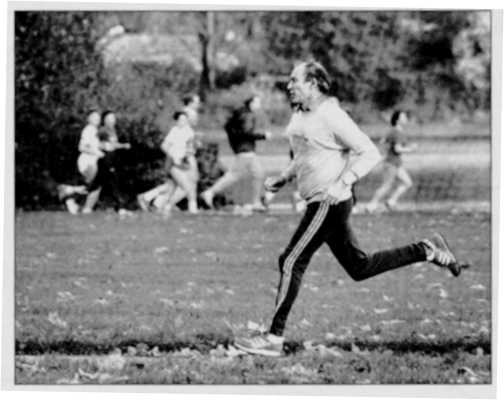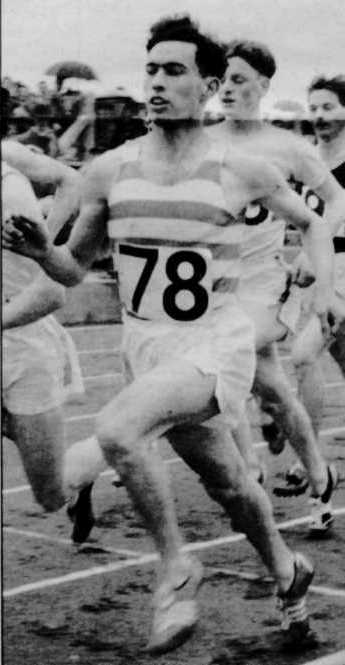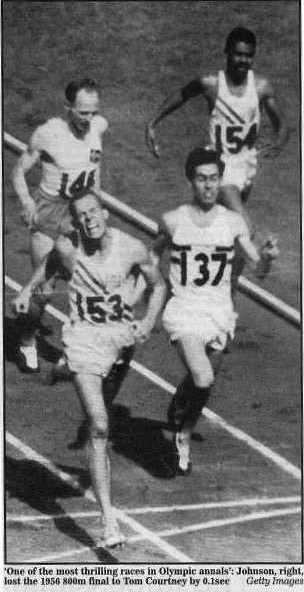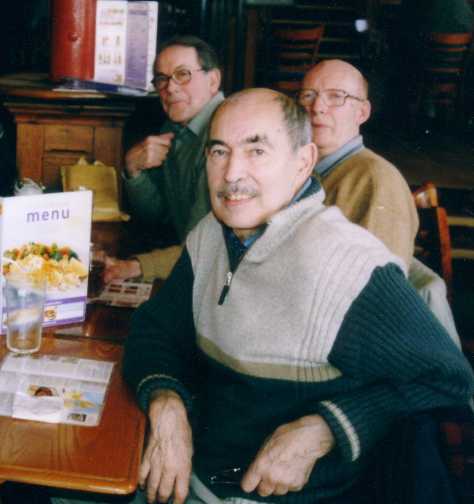From The Daily Telegraph for Saturday 4 September 2004
DEREK JOHNSON Talented half-miler who championed the cause
of athletes as their sport entered the era of professionalism
DEREK JOHNSON, who died on Monday aged 71, was one of the
finest half-milers in the 1950s, but earned wider fame as the
sharp-tongued creator of the International Athletes'
Association.
He caustically urged British athletes to defy Mrs Thatcher's
call for them to boycott the 1980 Olympics because of the
Russian invasion of Afghanistan, calling her "a fighting
cock who thought her success in the chicken run at home had
turned her feathers into armour". This provided
significant encouragement for the British athletes Steve
Ovett, Daley Thompson and Allan Wells, as well as Sebastian
Coe, the future MP, peer and secretary to William Hague as
Opposition leader, who went on to win gold medals at the
Moscow Games.
If the general public was surprised by Johnson's outburst, it
was only because it . had forgotten that he had once enjoyed
a reputation as the "Angry Young Man of Athletics".
Johnson clashed with team officials at the Melbourne Olympics
in 1956, because of their alleged meanness over pocket money
that nearly caused a strike. At the Empire Games in Cardiff
two years later, he was dropped from the 4 x 440 yards relay
to "prepare for the future". This provoked him to
write a letter saying that if officials were going to treat
athletes like performing monkeys they should be grateful for
the peanuts thrown at them, and that he would not run for
Britain again.
This led to the formation of the International Athletes' Club
which, under Johnson's leadership, did much to improve the
lot of athletes in that pre-professional era.
Johnson was to the fore in the successful campaign to stop
cigarette companies from sponsoring athletics a source of
personal satisfaction because his father had died of lung
cancer.
None of this, however, could overshadow the fact that Johnson
was a superb natural runner with a beautiful action, whose
ranking list range from sprints to crosscountry, hurdling and
steeplechase - is matched only by Sydney Wooderson and Ovett.
He won gold medals in the 880 yards and 4 x 440 yards relay
at the Empire Games in Vancouver in 1954. The next year he
ran the 880 yards in 1 minute 48.7 seconds, beating by half a
second the British record set by Wooderson in 1938.

Johnson, left, defeating BS Howson over 880 yards in a record 1m 48s in
1955.
But he is best remembered for the final of the 800 metres at
Melbourne when he was beaten by a foot in a titanic battle up
the home straight into a head wind by Tom Courtney, an
American who was almost five inches taller.
Johnson had to change his tactics after having trouble with
his starting blocks. He stayed boxed in, hoping to find a gap
to take the lead near the finish; and when one opened up 70
metres from the tape he went through like a ferret after a
rabbit.
His strategy almost worked. He and his rival were side by
side until almost the last stride when Courtney took the lead
to win by a tenth of a second, but it was so close that he
turned to Johnson and asked, ""Who won?" '"You
did, Tom," the Briton replied.
When they met again for lunch a few days later, Johnson
greeted Courtney with the remark, "I've run that race a
thousand times since Monday, Tom, and beat you every time."
"Yeah," the American retorted, ""I've
done that too and, Derek, I just ate you up."
Derek James Neville Johnson was born at Chigwell, Essex, on
January 5 1933. He won national school titles while at East
Ham Grammar School, and his sensational 440 yards in 48.8
seconds at the AAA junior championships in 1950 marked him as
a potential international star.
He soon fulfilled this with AAA championship wins and a fourth place in the
European 800 metres in 1954, the same year that he won his two gold medals
at Vancouver in the Empire Games. He won a relay silver in the 1958 Empire,
but lost his gold in the European that year when the British team that won
was disqualified.
After doing National Service as a second lieutenant in the
East Surreys in Egypt, he had a fine athletics career for
Oxford while up at Lincoln College.
Johnson was game for anything. He ran his own computer
company, tried his hand at property redevelopment, played a
major part in the restructuring of British athletics and
promoted road races and athletics meetings, including the
highly successful Coca-Cola meetings at Crystal Palace; he
was also secretary of the AAA of England.
'"I am not a believer, but I had this God-given gift,"
he said. "I could sprint. I could handle any distance. I
just had this natural talent." What should have been
Johnson's greatest years were blighted by health problems.
He lost part of one season through tonsillitis and then, in
1959, far more seriously, he contracted tuberculosis.
He had just finished his medical studies at Oxford and was to
start work as a doctor* in London when he collapsed after
running his fastest 1,500 metres in Finland while already
infected with TB, which he had probably contracted in the
chest medical ward. Months later he fell ill on the plane
after his great victory, and spent the next six weeks in bed.
"'One lung was obliterated and the other two thirds
affected," he recalled.
"Two more weeks and I would have had it." He spent
six months in a sanatorium, then gave up medicine for
computers and athletics. Four years later he started running
again.
Turning up at the White City aged 30 he did such a fine time
that it gave him hope that he might make it to the Olympics
in 1964. But it was not to be. He survived TB but was
crippled by Achilles tendonitis, for which there was no cure
in those days.
He remained with the International Athletics' Club until it
wound up in the late 1980s as the sport moved into the
professional era; later he helped to draft the constitution
of the British Athletics Federation.
Johnson still ran the London Marathon in under three hours
aged 50. Although diagnosed with leukaemia seven years ago he
joined the Olympic torch party as it went through London this
year.
Derek Johnson was divorced from his first wife, Maria; he is
survived by his second wife, Lakkhana, and their daughter.
Copyright Daily Telegraph 2004
*Derek never actually qualified. He did preclinical training at Oxford and then went to the (then) London Hospital for clinical study. He told me that, after he had recovered from TB, he realised that he couldn't continue with both his medical training and athletics. He opted for athletics. Before, and during his EHGS time he lived with his extended family at 98 Rosebury Avenue, Manor Park.
Jim Briggs, former classmate
From The Times Thursday, 9 September, 2004
Derek Johnson
Runner who won a silver medal at the 1956 Olympics and then did much to
foster athletics in Britain
DEREK JOHNSON was one of the most talented, versatile and courageous track
athletes this country has produced. Two years after becoming the Empire
Games 880 yards champion, he took silver in the 800 metres at the 1956
Olympic Games in Melbourne.
In his history of British athletics, Mel Watman declared that Johnson’s
battle with the bigger and stronger American Tom Courtney in the Olympic
final was “one of the most thrilling in Olympic annals, and Johnson was one
of the most heroic losers in athletics, timed in 1:47.8sec to Courtney’s
1:47.7sec.”
The anonymous athletics correspondent of The Times, a former Woodford Green
club-mate of Johnson, reported: “Johnson ran a race of superlative judgment
in a final which had everything a connoisseur could demand except a world
record. Johnson led Courtney for eight unbelievable strides towards the tape
before the American closed the gap and got home by two feet.”
Years later, writing for the Achilles Club, the former Oxford blue Johnson
recalled: “Perhaps the most apt commentary on Olympic finals in general was
an exchange between myself and Courtney in the Melbourne Olympic Village a
few days after. I greeted him with the remark: ‘I’ve run that race a
thousand times since, Tom, and beat you every time’. ‘Yeah,’ was the
excellent reply, ‘I’ve done that too and, Derek, I just ate you up’.”
Derek James Neville Johnson was born in Chigwell, Essex, in 1933. His mother
died during the birth. He soon became the best runner at East Ham Grammar
School; he ran the 880 yards in 2:01.2sec when he was 15. Two years later,
he made national headlines when he won the AAA Junior 440 yards, on a far
from helpful track, in the precocious time of 48.8sec.
Just over 5ft 9in and around 10st 9lb, Johnson had a long, flowing stride
and the capacity to remain relaxed when under pressure. Interviewed by the
sports historian David Thurlow this year, he said, “Though I am not at all
religious, I had what could, I suppose, be called this God-given gift to
handle nearly any distance, a natural talent.”
After National Service in Egypt as a second lieutenant with the East
Surreys, he read medicine at Lincoln College, Oxford, where he enjoyed a
fine athletics career. As OUAC secretary, he supervised the preparation of
the track for Roger Bannister’s sub-four-minute mile.
He began to work in the chest clinic of a London hospital where, he
believed, he contracted the tuberculosis which, with one lung obliterated
and the other two-thirds affected, obliged him to languish in a Midhurst
clinic during 1959.
On recovery, he quit medicine for computers. There seemed little chance of
his running again. Yet in 1963, to his own astonishment, Johnson returned to
the White City track near his London home and ran 1:50sec to finish fourth
in a top-class invitation 800 metres. Only Achilles tendonitis wrecked his
dream of competing in the 1964 Tokyo Olympics.
As a competitor, Johnson could be fiery. When he was deliberately bumped at
an indoor meeting in France, he returned the compliment so violently that
his rival crashed into the band playing in the centre of the arena— “I was
disqualified,” he said, “but it was worth it.”
Critical of the amateurish leadership of British teams in the Fifties,
Johnson helped to form the International Athletes’ Club, which did much to
improve the lot of athletes in the pre-professional era.
He became its secretary and then chairman, working well for several years
with former 10,000 metres world record holder David Bedford as they promoted
their own major international meeting.
In 1980 he encouraged British athletes to defy Margaret Thatcher’s call to
boycott the 1980 Moscow Olympics because of the Soviet invasion of
Afghanistan. As passionate as ever, he described the Prime Minister as a
“fighting cock, who thought her success in the chicken run at home had
turned her feathers to armour”.

Talented, versatile and courageous: Derek Johnson training members of the
Serpentine Club in Hyde Park, London, in 1986
His final athletic challenge, when he reached 50, was to run a marathon
in 2h 55:47sec.
In recent years, Johnson battled bravely against the leukaemia which was to
cause his death on the same day that Sydney Wooderson, whose 1938 British
half-mile record Johnson had beaten back in 1955, was quietly celebrating
his own 90th birthday at home.
Johnson is survived by his second wife, Lakkhana, and their seven-year-old
daughter.
....................................................................................................................................
From The Times 15 Sept 2004
LIVES REMEMBERED
Jon Carlisle writes: I remember Derek Johnson (obituary, September 9) coming
to Bryanston in about 1958 to open our new grass running track. An 880-yards
race was staged in which he took on a relay team comprising three of the
best sprinters in the school. I think the boys just got the better of him
but it was close.
He was an inspirational, god-like figure to us 14-year-olds, and we were all
alongside him in Melbourne later that year as he vainly fought down the
finishing straight to hold off the giant American, Courtney, in that
thrilling Olympic final.
Dr James Briggs writes: I was at school with Derek Johnson in 1944-51. For
three of our first four years we were in the same class at East Ham Grammar
School. Not only was he an outstanding athlete, but he was also highly
intelligent. In a class of very bright boys he was in the first three at the
end of each term. Some of his contemporaries went on to excel in medicine,
local government and academia - not bad for a school where many of our
parents only managed to scrape along.
Copyright: The Times 2004
Not all my memories were published - the Editor cut out my
second paragraph. For the record, here's what I wrote:
"managed to scrape along - some couldn't even afford the school uniform.
After his pre clinical work at Oxford he started at the then London hospital
for his clinical work. A couple of years ago he told me that he was given
special dispensations to miss some lectures, etc in order to give him time
for athletics. He then started to become ill with what turned out to be
widespread pulmonary TB. Before this diagnosis had been made he took himself
off to the London casualty dept, hardly able to climb the stairs into the
building. When he got there he was give a roasting by the Senior Registrar
for missing so many lectures. He was also told that he only had influenza
and to go home and take some aspirin. In desperation he went to his sports
doctor at St Mary's, where his TB was rapidly diagnosed. After he had
recovered he told later me that he realised that he couldn't do both
medicine and athletics. He chose athletics. One of the last pictures taken
of him, in late February 2004, can be seen at http://mysite.freeserve.com/jcbwebsite/ehgs/DJmar04.jpg
A full history of the school he attended is at http://mysite.freeserve.com/jcbwebsite/ehgs/"
From The Ilford Recorder Thursday 9 September 2004
The athletes' champion Derek Johnson dies, 71
RECORDER SPORT's Kevin O'Connor looks back on the career of one of East
London's finest Olympians - a giant of the track.
Derek Johnson, the man regarded as Woodford Green's finest ever athlete,
died last week aged 71, after a long battle with leukaemia.

Derek Johnson, pictured in his heyday, wearing the famous hooped vest of Woodford Green AC, whom he represented for so many years, in local, national and international competitions.
A superb runner over a range of distances, his most notable achievement was
his silver medal in the 1956 Melbourne Olympics, when he was beaten by the
narrowest of margins by the American Tom Courtney in the 800 metres.
But, sharp-tongued Johnson earned wider fame off the track as the creator of
the International Athletes Association.
He famously urged British athletes to ignore prime minister Margaret
Thatcher's advice to boycott the 1980 Moscow Olympics.
His stance provided significant encouragement to the likes of Daley
Thompson, Seb Coe, Steve Ovett and Allan Wells, who all won gold in Moscow.
Chigwell-born Johnson said at the time: "She (Margaret Thatcher) is a
fighting cock who thinks her success in the chicken run at home has turned
her feathers into armour."
While that outburst earned him notoriety, his words came as no surprise to
people that knew him as the angry young man of athletics.
Johnson was the scourge of officialdom in the late 1950s and clashed with
officials at Melbourne over expenses also accusing them of treating athletes
like "performing monkeys."
He was also instrumental in stopping cigarette companies from sponsoring
athletics, which came as a great source of satisfaction as he had lost his
own father to lung cancer.
Woodford president John Salisbury was also among the IAA's founders along
with London marathon founder Chris Brasher, Olympic bronze medal hurdler
John Disley and Commonwealth champion pole vaulter Geoff Elliott.
Salisbury remembers Johnson as a deeply passionate man, as well as a superb
athlete.
"I knew Derek during his competitive years as an opponent at inter-club,
county and area level and a GB team-mate in Olympic and Commonwealth Games,
as well as in European Championships and international matches, as part of
the same 4x400m relay team.
"He was a wonderful athlete and also a wonderful man to have on your side. A
great Olympian, a loyal Woodford Green club man and a great character."
Johnson first came to Woodford Green's attention when running in the annual
schools trophy meeting, single-handedly overturning Wanstead's 40m lead to
give his old school, East Ham Grammar, victory.
He blossomed at the club and went on to win several AAA and Empire Games
titles.
Despite contracting tuberculosis at the age of 30, he came back to run the
800m in 1 min 50 secs at White City to give him hope that he could make the
1964 Tokyo Olympics.
But, while he overcame TB, it was Achilles tendonitis that brought his
career to a halt as there was no cure for it in those days.
Johnson, who did his national service in Egypt, is survived by his second
wife, Lakkhana and their daughter.
Copyright: The Ilford Recorder 2004
From The Independent 15 September 2004
Olympic medallist and 'angry young man' of athletics
Derek James Neville Johnson, athlete: born Chigwell, Essex 5 January 1933;
twice married (one daughter); died London 30 August 2004.
A story told by David Bedford, his close friend and long-time ally in the
sometimes arcane world of athletics administration, says much about the
often antagonistic approach, coupled to a sharp-minded wit and willingness
to try new things, that often characterised Derek Johnson, the 1956 Olympic
800-metres silver medal-winner.

"Derek was in his late fifties, yet he agreed to travel to the European
Championships in Split on the back of my motorbike," said Bedford, the
former 10,000m world record-holder who is now the race director of the
London Marathon. By the end of the first day's travel, Johnson was windswept
and uncomfortable, and his constant complaints had annoyed Bedford. "I
warned him, one more whinge, and he'd be off," Bedford recalls, "but first
thing the next morning, Derek said, 'This is just like being in the Army.'
'That's it,' I said.
"Off you get," Bedford ordered Johnson.
"But Dave, you misunderstand me," Johnson replied, "I really loved the Army
. . ."
And Johnson really loved athletics, and he will have certainly enjoyed the
achievement of his fellow 800m runner Kelly Holmes in winning her second
Olympic gold medal in Athens less than 48 hours before his death.
Born in Chigwell, Essex, in 1933, Derek James Neville Johnson possessed a
razor-sharp mind that took him from East Ham Grammar School to medical
studies at Lincoln College, Oxford, thence to careers in computers and
property. Yet it was the abilities of Johnson's legs, heart and (eventually
TB-ravaged) lungs which earned him his greatest fame and his lifelong
passion for athletics, both on and off the track.
Johnson was a contemporary in the Oxford University Athletics Club of Roger
Bannister, organising the Iffley Road track for the first sub-four- minute
mile in 1954. Johnson went on to win that year's Empire Games 880yd title as
well as a relay gold medal. But, while his performances on the track, from
his national junior title for 440yd in 48.8sec in 1950, were notable, it was
his off-track deeds which did much to enable the likes of Kelly Holmes and
modern-day professional athletes to earn the tens of thousands of pounds
that their abilities can command.
He was dubbed an "angry young man" for his protests over athletes' derisory
daily allowance at the 1956 Olympics in Melbourne, and it was a tag he would
never shake off. Despite his Oxbridge background, Johnson was no fan of the
sporting establishment. A leading light in the setting up of the "athletes'
union", the International Athletes' Club, when his high-energy approach was
requested again in the 1980s as the IAC faced a financial crisis, Johnson
was then described by one of his numerous critics as the sport's "militant
tendency".
In 1980, he organised the IAC's opposition to Margaret Thatcher's call for
sportsmen to boycott the Moscow Olympics. "When she calls on the CBI to ask
its members to stop trading with the Soviet Union over Afghanistan, then
maybe we'll reconsider our position," Johnson would say. British track
athletes went to Moscow, and Allan Wells, Daley Thompson, Steve Ovett and
Sebastian Coe all won gold medals.
In the 1990s, Johnson did much of the constitutional work to set up the
British Athletic Federation and he also had a spell as secretary of the AAA,
yet his passion for competition never waned. At 50, he ran the marathon in
less than three hours and, well into his sixties, he could be seen leading a
gaggle of assorted road runners on training sessions of his own devising
around Hyde Park, taking great pride in his achievements as a coach and
mentor. Unable to race due to old running injuries, he even turned out in
Southern League matches as a hammer thrower for his club.
A proud Londoner, in June Johnson got to carry the Olympic torch as it made
its way through the capital, but, already very weak after a five-year battle
against leukaemia, he had to do so in the back of a taxi.
A bout of tuberculosis contracted on the wards when a student doctor
curtailed his international track career in 1959, causing Johnson to spend a
year in a sanatorium. Although he did not pursue the medical career, his
interest never waned: his mother had died in childbirth, his father of lung
cancer. Thus, one of Johnson's finest, and most successful, campaigns was
against tobacco sponsorship in athletics.
It is fair to say, however, that until Ovett and Coe's emergence in the
1970s, Derek Johnson was Britain's best two-lap racer since Sydney Wooderson
in the 1930s, breaking Wooderson's British record and improving it to 1:46.6
in 1957, the year after his finest performance.
Johnson missed out on Olympic gold at the Melbourne Games by a mere 0.1sec
to the American Tom Courtney, in a race which has been described as "one of
the most thrilling in Olympic annals". Johnson himself would tell that tale
of how he met Courtney in the Olympic village a couple of days after the
final.
"I've run that race a thousand times since Monday, Tom, and beat you every
time," Johnson said.
"Yeah," the American replied. "I've done that too and, Derek, I just ate you
up."
Steven Downes
Copyright The Independent 2004
My last picture of him is at one of the regular local get-togethers with his classmates at the George in Wanstead. The picture below was taken in late February 2004 at one of these.

Jimmy Hansell behind. Bob Stapleton at rear.
Jim Briggs, former classmate.